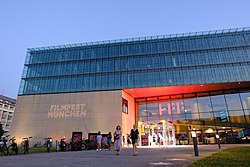 |
|---|
| Film festivals |
A human rights film festival is an activist film festival that screens films on human right related topics and hosts pre/post-screening events to promote awareness for human rights causes.[1] Human rights film festivals fall beneath the category of topic specific film festivals.[2] These festivals employ the use of universal human rights language, made popular by the United Nations Declaration of Human Rights, to convey the importance of the festivals' programmes to their audiences.[3] The first human rights film festival to take place anywhere around the world was the New York City based Human Rights Watch International Film Festival (HRWIFF) in 1988.[4] Since then many other human rights film festivals have formed around the world with the most notable festivals being One World International Human Rights Documentary Film Festival in Prague, Movies that Matter in The Hague, International Film Festival and Forum on Human Rights (FIFDH) in Geneva, Festival Internacional de Cine de Derechos Humanos (FICDH) in Buenos Aires, and Freedom Film Festival (FFF), organized in Kuala Lumpur.[1][4][5] Movies that Matter has also created The Human Rights Film Network which aids in facilitating the creation of new human rights film festivals, while also allowing existing human rights film festivals membership to their network by agreeing to abide by their Charter.[6] Although human rights film festivals are widely praised for their efforts to raise awareness on human rights issues they have also been subject to criticism surrounding issues of the "humanitarian gaze", NGOization, and commercialization.[7][8]
- ^ a b Valck, Marijke de (2017). "Current trends across three European human rights film festivals". NECSUS. European Journal of Media Studies. 6 (1): 209–218. doi:10.25969/mediarep/3385.
- ^ Deshpande, Shekhar A. (2018). World cinema : a critical introduction. Meta Mazaj. London. p. 110. ISBN 978-0-415-78356-9. OCLC 1005113451.
{{cite book}}: CS1 maint: location missing publisher (link) - ^ Wils, Tyson (2017). "Refusal to Know the Place of Human Rights: Dissensus and the Human Rights Art and Film Festival." Activist Film Festivals: Towards a Political Subject, edited by Sonia M. Tascon and Tyson Wils. Bristol, UK / Chicago, USA: intellect. pp. 121–137. ISBN 978-1-78320-634-6.
- ^ a b Tascón, Sonia M. (2015). Human rights film festivals : activism in context. Houndmills, Basingstoke, Hampshire. ISBN 978-1-137-45424-9. OCLC 899260399.
{{cite book}}: CS1 maint: location missing publisher (link) - ^ Cite error: The named reference
:6was invoked but never defined (see the help page). - ^ "Charter | Human Rights Film Network". www.humanrightsfilmnetwork.org. Retrieved 2022-03-26.
- ^ Tascón, Sonia M. (2019). Visual communication for social work practice : power, culture, analysis. London. pp. 96–114. ISBN 978-1-351-24195-3. OCLC 1050360613.
{{cite book}}: CS1 maint: location missing publisher (link) - ^ Winton, Ezra, and Svetla Turnin “The Revolution Will Not Be Festivalized: Documentary Film Festivals and Activism.” (2017). Activist Film Festivals: Towards a Political Subject. Bristol, UK / Chicago, USA: edited by Sonia M. Tascon and Tyson Wils, intellect. pp. 83–103. ISBN 978-1-78320-634-6.